To answer your question… Yes, yes it is. (We use Sales Navigator and it works.)
BUT you have to use it the right way.
The problem is that many sales professionals use Sales Navigator the wrong way, and because of this, they aren’t finding their ideal prospects.
(And it doesn’t matter if you are a recruiter , sales manager, CEO, or a massive corporation; using it correctly is the key to Linkedin Sales Navigator success.)
Keep reading as we dive a little deeper into why Sales Navigator is worth it.
What is Linkedin Sales Navigator exactly?
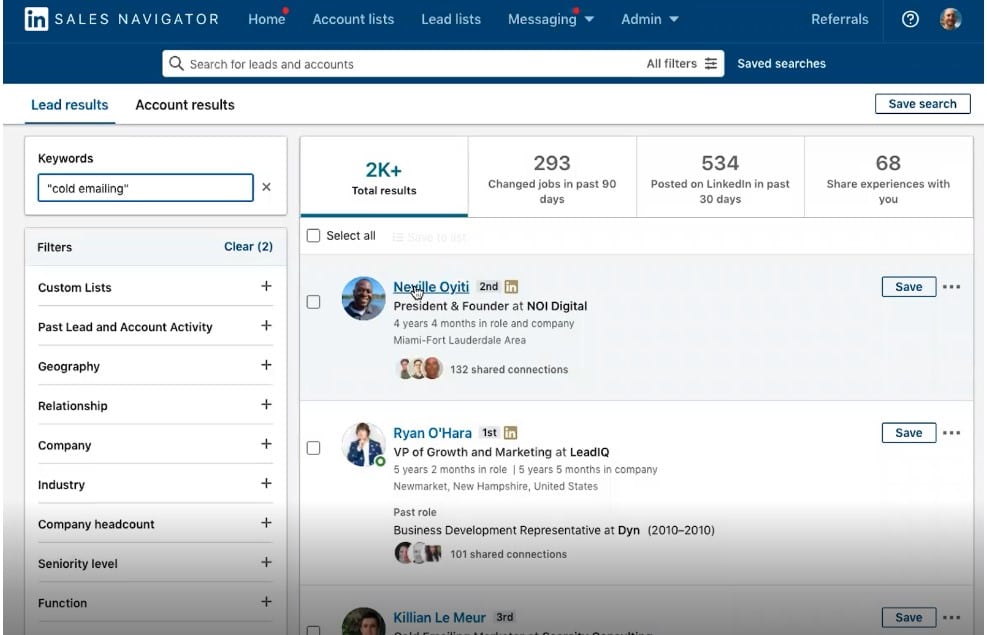
Linkedin Sales Navigator is a prospecting tool that Linkedin itself provides. It provides different search filters that allow sales teams to find the right prospects.
Whether you are looking for decision-makers at companies or even a company size, you will be able to find the info, when using Linkedin Sales Navigator .
Therefore, if you are a sales rep who’s keen on LinkedIn outreach, you should really invest in using this sales tool.
Why?
Because this tool offers various features that can be really helpful if you know how to use it properly.
LinkedIn Sales Navigator is 33% accurate.
This is why we always double-verify that each prospect is truly on target. Our data must be 100% correct before starting our campaign. The video below goes into more detail.
How much does LinkedIn Sales Navigator cost?
There are 3 subscription plans to choose from, each with different features and pricing.
-
Linkedin Sales Navigator Core – $99.99 per month
-
Linkedin Sales Navigator Advanced – $149.00 per month
-
Linkedin Sales Navigator Advanced Plus – Pricing is customized towards your need, but some sources say you can expect to pay $1,600 per seat per year.
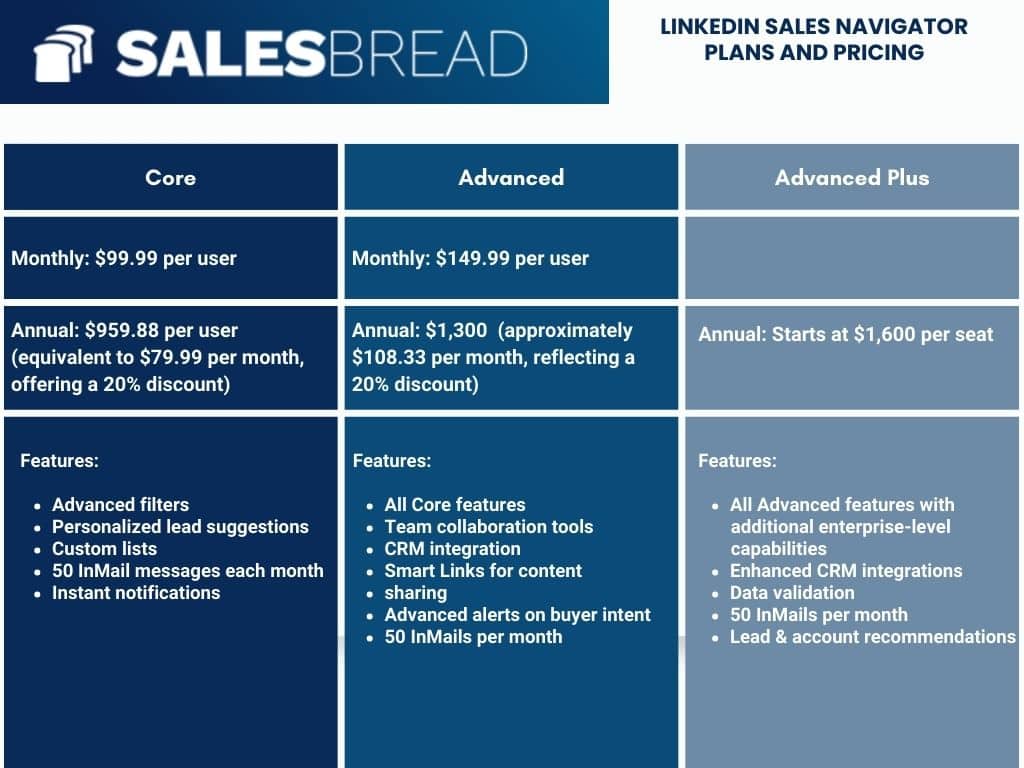
Some of the features are:
-
Advanced lead and company search
-
Alerts on your saved leads and accounts
-
Customized lists
-
Content sharing and engagement tracking
-
CRM integration (whether it’s Salesforce, or something else.)
-
InMail (50 InMails for each plan)
-
Access to LinkedIn subscriptions
-
Team collaboration tools
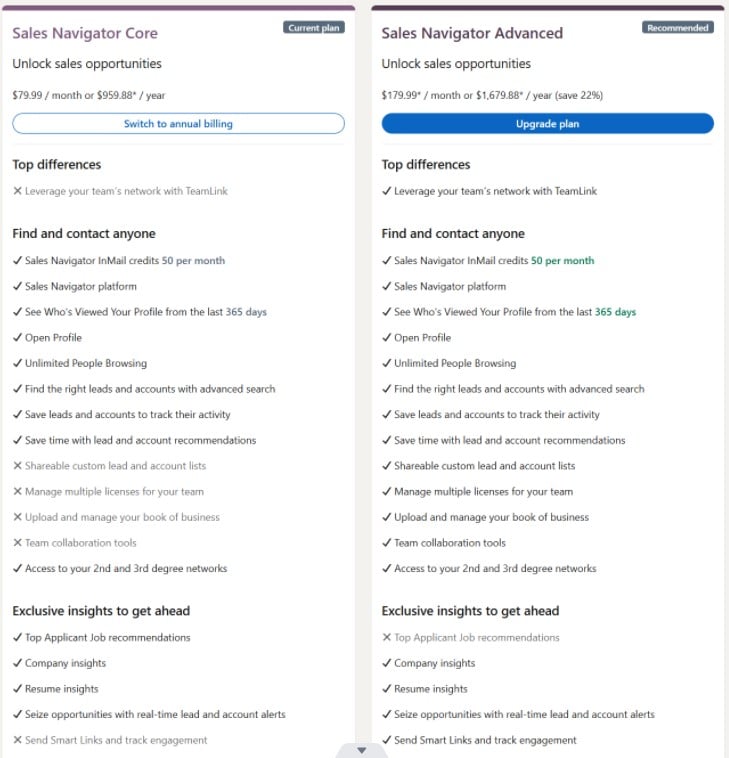
The good news is that LinkedIn does offer 30-day free trials, so if you decide that it’s not the right tool for you, you can cancel it at any time.
LinkedIn Sales Navigator Pros and Cons
What are the Pros of LinkedIn Sales Navigator?
Below are some pros listed as bullet points, keep reading to see why these pros are helpful.
-
Advanced search filters
-
Lead recommendations
-
Real-time insights
-
Team link
-
CRM integration
-
Saved Searches
-
50 InMail messages per month
-
Advanced Lead and Account Insights (Analytics)
-
You can make custom lead lists
-
Activity tracking
-
Sales Navigator mobile app
1. Advanced search filters – This makes it easy to build granular, custom prospect lists
The good news is that Sales Navigator has advanced search capabilities that can help you build custom lists of prospects and leads.
Here are some of the filters that you can use to find the right people. You could either filter by:
Lead
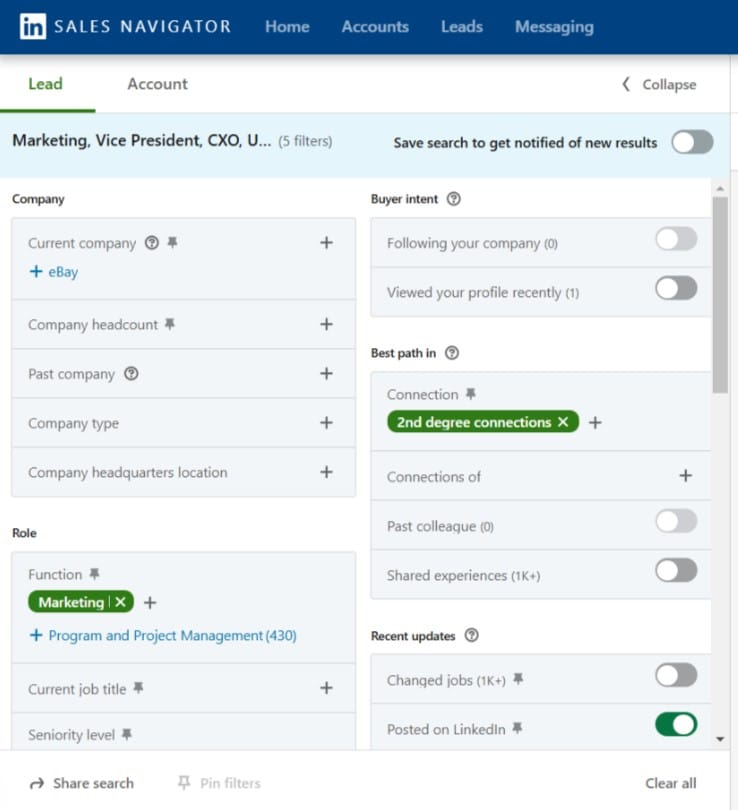
Some lead filters include:
- Keywords
- Geography (Location)
- Relationship (1st, 2nd, or 3rd-degree connections)
- Industry
- Job Title
- Company Name
- Company Size
- Seniority Level (e.g., Entry, Manager, Director, VP, CXO)
- Function (e.g., Marketing, Engineering, Sales)
- Years in Current Position
- Years at Current Company
- Years of Experience
- Member Since (When they joined LinkedIn)
- Posted on LinkedIn in the Past 30 Days
- Changed Jobs in the Past 90 Days
- Shared Experiences with You (e.g., mutual groups, companies)
- Connections of (specific individuals)
- Profile Language
- Education (Schools attended)
- Groups (LinkedIn group memberships)
- Tags (if you’ve tagged leads in your account)
Or by Account:

Some Account search filters (company searches) include:
-
Keywords
-
Geography (Location)
-
Industry
-
Company Size
-
Company Type (e.g., Public, Private, Nonprofit, etc.)
-
Revenue (Annual company revenue)
-
Headcount Growth
-
Department Size (specific teams like Engineering or Marketing)
-
Technologies Used (e.g., CRM tools, cloud software)
-
Fortune Ranking
-
Annual Employee Growth
-
Job Opportunities (companies actively hiring)
As you can see, you can build really granular lists based on the above filters.
Here’s an example of how to use LinkedIn Sales Navigator for building a list of companies that are using software like VMWare.
Sales Navigator makes it so easy to build your own list of leads.
Plus, LinkedIn is more likely to have the latest job info, meaning less time spent verifying that your lead generation data is accurate.
Lead recommendations – A list of 100 leads you might not have had
This might be helpful. Because LinkedIn will offer you a list of 100 lead recommendations that you might not have had. This list is based on intent data and your past activity. Lead recommendations are available in each Sales Navigator account.
Real-Time Insights – Get altered to specific changes
With LinkedIn Sales Navigator, you get real-time insights about your leads and accounts. This means that you can stay up to date when prospects make specific changes like job moves, company updates, or posts from your prospects.
For example, if a decision-maker at your target company switches roles, you can quickly adjust your approach or congratulate them. This is a great way to include personalization in your outreach.
These timely updates help you start relevant conversations and build stronger connections.
Team Link – For warm outreach
Team Link lets you tap into your team’s network to find warm introductions to potential leads. You can use shared connections to increase your chances of getting your foot in the door to start conversations.
For instance, if a colleague already knows someone at a company you’re targeting, you can ask for an introduction, making your outreach more effective and personal.
CRM Integration – For streamlined workflow
To streamline workflow, you can integrate Sales Navigator with your CRM tools like HubSpot and Salesforce.
This feature eliminates the hassle of manually transferring data and ensures your lead and account information stays up-to-date. For example, when you sync LinkedIn data with Salesforce, this will save you time and reduce errors, so you can focus on closing deals rather than managing admin tasks.
Saved Searches – For convenience and organization
Saved Searches help you stay organized and save time. When you search for specific leads or companies, you can save the search and receive automatic updates when new matches appear.
This ensures you don’t miss out on fresh opportunities. For example, if you’re targeting tech startups, your saved search will notify you whenever new companies meet your criteria.
Just a word of caution here, if you decide to downgrade your LinkedIn plan, “you will permanently lose access to the Sales Navigator microsite, saved leads, saved accounts, InMail message history, and any unused InMail credits.“

50 InMail Messages Per Month – To supplement your outreach
EACH Sales Navigator gives you 50 InMail credits every month, allowing you to reach out to prospects even if you’re not connected. We like to use InMail as a supplementary method to our outreach campaigns.
Advanced Lead and Account Insights (Analytics) – For a deeper understanding of your prospects
With advanced analytics, you gain a deeper understanding of your prospects. You can see data like company growth, key decision-makers, and employee headcounts.
For example, if a company has recently hired a new marketing head, you can tailor your pitch to address their priorities. These insights help you craft more targeted and compelling messages.
Custom Lead Lists – Keep your prospects organized from cold to hot
You can create custom lead lists to organize your prospects based on criteria like industry, location, or engagement level.
This keeps your pipeline clear and focused. For example, you could create separate lists for warm leads, cold prospects, and existing clients, helping you prioritize your outreach efforts effectively.
Activity Tracking
Activity tracking ensures you stay on top of your interactions with leads. You can see when someone views your profile, responds to a message, or engages with your content.
This visibility allows you to follow up at the right time. For example, if a prospect recently viewed your profile, you might want to send them an outreach message.
Sales Navigator Mobile App – For convenience
The mobile app keeps you connected wherever you are. You can research leads, send messages, and get real-time alerts on the go.
For instance, if you’re traveling to a conference and meet a potential client, you can instantly check their LinkedIn profile and send a follow-up message, ensuring you never miss an opportunity.
What are the Cons of LinkedIn Sales Navigator?
-
Data Accuracy
-
Filters can be too broad
-
It can be intimidating for new users
-
You can lose data
-
It can freeze up quite a bit
Data Accuracy
LinkedIn Sales Navigator relies heavily on users entering correct/current information. For example, we’ve had leads that reply with “I left Microsoft ages ago, I just haven’t updated my profile yet.”
Besides this, we conducted a study and found that LinkedIn Sales Nav is only 33% accurate. If you think about it, “job titles” and “industries” are very much user-selected. For example, if your company sells a fitness app, they might classify their business as health and wellness or even technology.
This means that you might miss out on a ton of leads. This is why, it’s really important to know how to use the tool correctly.
Here are our top LinkedIn Sales Navigator Search Tips.
Filters can be a bit too broad
We have found that filters can be a bit too broad sometimes. For example, the size filter.
If you want companies with 80 employees, the filter is 51-200 which means you need to take additional steps to exclude those on the higher end.
It can be intimidating for new users
LinkedIn Sales Navigator offers many features, and its complexity can feel overwhelming at first
Setting up integrations like a CRM or customizing preferences can also be a little tricky for beginners. You might struggle to connect tools like Salesforce or to interpret detailed analytics about your prospects.
You could lose data
Unless you sign up for team access, Sales Nav is connected to one account, so you could lose access to data if the specific person who owns the account moves on to another role. The same is true of downgrading your plan.
It freezes up quite a bit
We have also found that Linkedin Sales Navigator freezes up quite a bit, especially when doing Boolean searches. It can be complicated and if you are using a lot of filters, it can be slow. This isn’t a major flaw, but it can be frustrating sometimes.
LinkedIn Sales Navigator Reviews
According to G2, Sales Nav has a 4.3-star rating out of 5.
Here’s what some users had to say: (Feel free to check more out on G2.)


Just a quick note on InMails
At Salesbread, we have done various tests this year to see if using more InMails are worth it, but we still prefer sending LinkedIn Connection Request messages instead.
This is for 2 reasons.
Firstly, it’s free. And Inmails are pretty much the same as connection requests, in the sense that they are messages that sales teams use to get their foot in the door.
And secondly, by sending requests to those in your second-degree connections, you already have some commonalities.
Therefore, the chances of the prospect replying to you will be greater. You can use InMails as a last resort if you really need to contact someone that you think would be perfect for your lead list.
Work on getting prospects to reply to your connection requests first, before paying for a messaging service, where leads might not even reply.
What we love about LinkedIn Sales Navigator
This sales prospecting tool is great for marketers looking for prospects that work for a specific company; So, if you have a list of companies, you will be able to find people who work in those particular companies and target them.
You can also get really granular about how you target prospects, from their job title, and geography to their seniority in a business. You can even use specific keywords to search for a prospect.
Take a look at some screenshots below as examples.
Filter for titles

As you can see below, you can include a variety of very specific titles when prospecting.
Filter for keywords
SalesBread suggests using negative keywords because when you look at a specific keyword, the outcome is not always the best. This is also known as a Boolean search, and it will help refine your list.
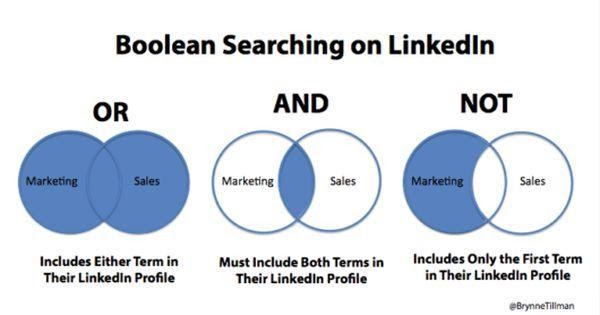
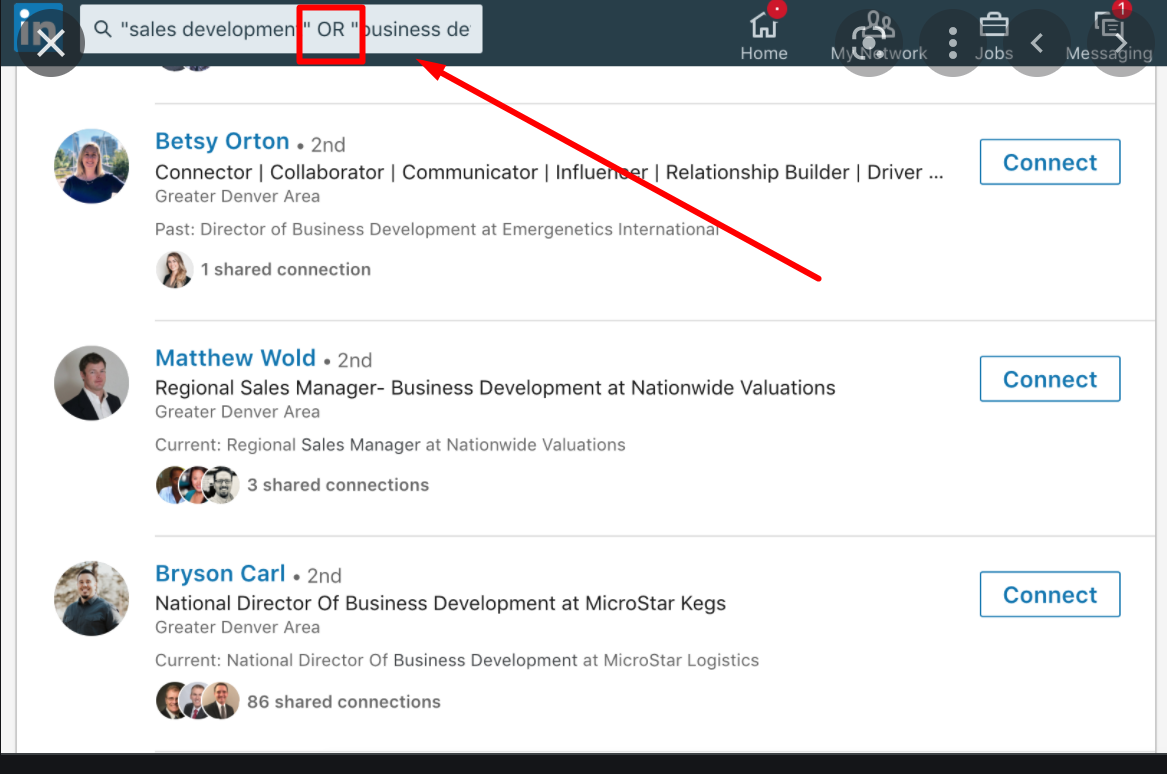
Is LinkedIn Sales Navigator Worth it?
At Salesbread we really find Sales Navigator extremely helpful in finding relevant leads, especially if we are looking to target specific people at companies. It allows us to refine our lists, and contact prospects with ease, and more often than not we receive many replies.
In fact, we can book 1 meeting or appointment per day for our clients through Sales Nav.
But… (yes, there is a but…)
We know how to use LinkedIn Sales Navigator the right way, and this is why we get results.
Many other companies cancel their subscriptions because prospects aren’t replying to their messages.
The problem isn’t Linkedin Sales Navigator itself, but it could be that you might be using the filters the wrong way. Or perhaps the salesperson sending messages to prospects might not be writing the best kind of messages. They could lack personalization, or maybe they are just too “salesy.”
Perhaps you are sending out too many automated replies and not “ real-time ” messages.
Remember people like engaging with real people and not robots.
So Sales Navigator is worth it, but it helps if you know how to use the platform the right way.
Final Thoughts
Sales Nav is worth it if you know how to use it correctly.
If you have the service, and it doesn’t seem to be working for you, let’s hop on a free 15-minute consultation, and we will see how we can help you. (Maybe it’s as simple as all you need is a warm introduction in your connection requests.)
But if you’re looking to close more deals and aren’t getting the leads you would like, contact us today.
